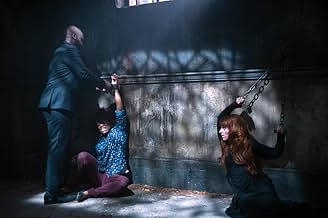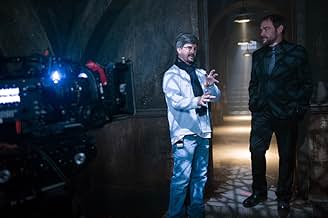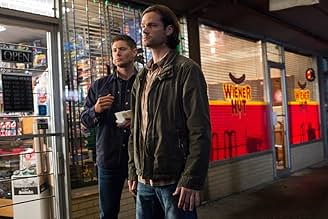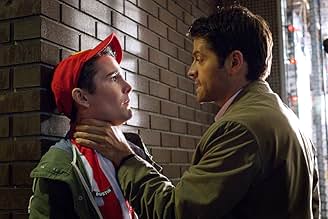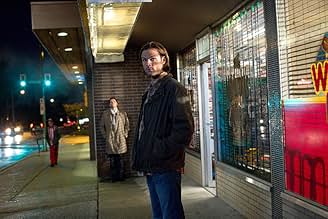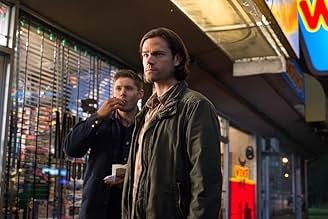The Things We Left Behind
- Episódio foi ao ar 9 de dez. de 2014
- 14
- 42 min
AVALIAÇÃO DA IMDb
8,1/10
3,9 mil
SUA AVALIAÇÃO
Adicionar um enredo no seu idiomaWhen Castiel finds Jimmy's daughter in a group home, she persuades him to break her out; Crowley is faced with a big challenge.When Castiel finds Jimmy's daughter in a group home, she persuades him to break her out; Crowley is faced with a big challenge.When Castiel finds Jimmy's daughter in a group home, she persuades him to break her out; Crowley is faced with a big challenge.
- Direção
- Roteiristas
- Artistas
Mark Sheppard
- Crowley
- (as Mark A. Sheppard)
Kathryn Newton
- Claire Novak
- (as Kathryn Love Newton)
Jason William Day
- Goon 1
- (as Jason Day)
Avaliações em destaque
Towards the back end of the series there are way too many episodes dealing with melodramatic relationships among the characters. Cas trying to make peace with Claire is the focal point of this episode and while that story is engaging it is not horror. And it is not why I watch the show. This episode-like a lot of them in the later seasons-feels too much like a soap opera when the show should be about ghosts and ghouls. I think a more creative writing team could have introduced Claire in a much different way-perhaps she made a bargain to be a vessel for an angel who was also pissed at Cas?- and concept could have been folded into the show better.
"The Things We Left Behind," the ninth episode of Supernatural's tenth season, directed by Guy Norman Bee and written by Andrew Dabb, serves as the midseason finale and marks a tonal return to the show's core themes of family, consequence, and the enduring scars of abandonment. The episode is notable for its emphasis on human drama over supernatural spectacle, focusing on the emotional fallout for characters who have been left behind-by parents, by fate, or by their own choices. The narrative weaves together multiple storylines, each exploring the impact of absence and the sometimes devastating attempts to reclaim what has been lost.
The episode opens with a chilling nightmare: Dean, splattered with blood and surrounded by mutilated corpses, is jarred awake, foreshadowing the darkness that still lurks within him due to the Mark of Cain. This sequence, rendered in muted colors and disorienting cuts, immediately sets a foreboding tone and reminds viewers that Dean's struggle is far from over. The horror is not merely external but internalized, with Dean's own potential for violence becoming the episode's most menacing "monster." This internal threat is a central motif, as Dean's efforts to suppress his darker urges are tested throughout the hour, culminating in a brutal and tragic climax.
Parallel to Dean's turmoil, the episode revisits Castiel's ongoing quest to reconnect with humanity through Claire Novak, the daughter of his former vessel, Jimmy. Castiel's well-intentioned but clumsy attempt to re-enter Claire's life is fraught with emotional complexity. Claire, now a teenager hardened by years in foster care and abandonment, is initially hostile, blaming Castiel for taking her father away and upending her life. Their interactions are marked by awkwardness and pain, as Castiel tries to offer guidance and protection but is confronted with the reality that his presence is a reminder of loss rather than comfort. The episode uses this storyline to interrogate the ethics of angelic possession and the collateral damage of supernatural intervention, themes that the show had previously only touched upon.
Claire's arc takes a darker turn as she flees from Castiel and seeks out Randy, a manipulative father figure who exploits her loyalty for his own criminal ends. The depiction of Claire's vulnerability-her willingness to commit robbery and her entanglement with dangerous men-serves as a sobering counterpoint to the Winchesters' more fantastical struggles. The episode does not shy away from portraying the harsh realities faced by abandoned children, and Kathryn Newton's performance as Claire is both raw and affecting, capturing the character's mix of defiance and longing for genuine connection.
Meanwhile, Crowley's subplot with his mother, Rowena, injects a different flavor of familial dysfunction. Rowena's manipulations and Crowley's conflicted responses highlight another facet of the episode's exploration of parental relationships. Rowena's presence is both a source of comic relief and a reminder of the toxic legacies that can be passed from parent to child. Her attempts to regain power and influence over Crowley echo the broader theme of the episode: the struggle to escape the shadows of those who have shaped us, for better or worse.
The episode's pacing is deliberate, allowing for moments of introspection and character development. The direction by Guy Norman Bee is understated but effective, using close-ups and lingering shots to capture the emotional weight of each scene. The cinematography makes strong use of muted palettes and shadow, particularly in Dean's nightmare and the climactic showdown in the abandoned house. The editing is tight, building tension as the various storylines converge toward a violent and tragic resolution.
The climax of "The Things We Left Behind" is among the most harrowing in recent seasons. When Dean, Sam, and Castiel track Claire to Randy's hideout, they find themselves in a standoff with armed criminals. As the situation spirals out of control, Dean, pushed to the brink by the Mark of Cain, loses control and slaughters the men in a frenzy of violence. The aftermath-Dean on his knees, bloodied and traumatized, surrounded by corpses as Sam and Castiel look on in horror-serves as a stark reminder of the high cost of the supernatural burdens the Winchesters bear. The scene is shot with a raw intensity that lingers, foregoing a traditional cliffhanger in favor of a slow, devastating reckoning.
One of the episode's strengths is its willingness to foreground the consequences of the characters' actions and the pain of abandonment. The script draws explicit parallels between Claire's abandonment by her parents, Crowley's fraught relationship with Rowena, and the Winchesters' own history of loss and sacrifice. The result is an episode that is thematically cohesive, if sometimes heavy-handed in its messaging. The absence of a clear external antagonist highlights the show's evolution: the true enemy is often the damage left behind by those we love, and the monsters we become in our attempts to heal.
Not all elements of the episode are equally successful. Some critics have noted that the midseason finale lacks the suspense and spectacle typical of previous years, opting instead for a more understated and somber tone. The focus on human villains rather than supernatural threats may disappoint viewers seeking the show's trademark horror. However, this creative choice reinforces the idea that the most profound horrors are often rooted in human frailty and the scars of abandonment. The episode's emotional impact is heightened by strong performances from the core cast, particularly Jensen Ackles, whose portrayal of Dean's unraveling is both subtle and deeply affecting.
In the broader context of Supernatural's legacy, "The Things We Left Behind" stands as a meditation on the lasting effects of trauma and the struggle for redemption. The episode's exploration of family, consequence, and the search for belonging resonates both within the show's mythology and in contemporary culture, where questions of identity and the legacy of parental choices remain deeply relevant. By focusing on the internal battles faced by its characters, the episode reaffirms Supernatural's status as a drama rooted in the complexities of human emotion, even as it continues to engage with the fantastical.
Ultimately, "The Things We Left Behind" is a quietly devastating episode that forgoes spectacle in favor of character-driven storytelling. Its power lies in its unflinching examination of the wounds that shape us and the desperate, sometimes destructive, attempts to reclaim what has been lost. The episode's conclusion, with Dean broken and Sam and Castiel struggling to comprehend the carnage, is a haunting reminder that the things we leave behind are never truly gone-they linger, shaping our choices and our fates.
The episode opens with a chilling nightmare: Dean, splattered with blood and surrounded by mutilated corpses, is jarred awake, foreshadowing the darkness that still lurks within him due to the Mark of Cain. This sequence, rendered in muted colors and disorienting cuts, immediately sets a foreboding tone and reminds viewers that Dean's struggle is far from over. The horror is not merely external but internalized, with Dean's own potential for violence becoming the episode's most menacing "monster." This internal threat is a central motif, as Dean's efforts to suppress his darker urges are tested throughout the hour, culminating in a brutal and tragic climax.
Parallel to Dean's turmoil, the episode revisits Castiel's ongoing quest to reconnect with humanity through Claire Novak, the daughter of his former vessel, Jimmy. Castiel's well-intentioned but clumsy attempt to re-enter Claire's life is fraught with emotional complexity. Claire, now a teenager hardened by years in foster care and abandonment, is initially hostile, blaming Castiel for taking her father away and upending her life. Their interactions are marked by awkwardness and pain, as Castiel tries to offer guidance and protection but is confronted with the reality that his presence is a reminder of loss rather than comfort. The episode uses this storyline to interrogate the ethics of angelic possession and the collateral damage of supernatural intervention, themes that the show had previously only touched upon.
Claire's arc takes a darker turn as she flees from Castiel and seeks out Randy, a manipulative father figure who exploits her loyalty for his own criminal ends. The depiction of Claire's vulnerability-her willingness to commit robbery and her entanglement with dangerous men-serves as a sobering counterpoint to the Winchesters' more fantastical struggles. The episode does not shy away from portraying the harsh realities faced by abandoned children, and Kathryn Newton's performance as Claire is both raw and affecting, capturing the character's mix of defiance and longing for genuine connection.
Meanwhile, Crowley's subplot with his mother, Rowena, injects a different flavor of familial dysfunction. Rowena's manipulations and Crowley's conflicted responses highlight another facet of the episode's exploration of parental relationships. Rowena's presence is both a source of comic relief and a reminder of the toxic legacies that can be passed from parent to child. Her attempts to regain power and influence over Crowley echo the broader theme of the episode: the struggle to escape the shadows of those who have shaped us, for better or worse.
The episode's pacing is deliberate, allowing for moments of introspection and character development. The direction by Guy Norman Bee is understated but effective, using close-ups and lingering shots to capture the emotional weight of each scene. The cinematography makes strong use of muted palettes and shadow, particularly in Dean's nightmare and the climactic showdown in the abandoned house. The editing is tight, building tension as the various storylines converge toward a violent and tragic resolution.
The climax of "The Things We Left Behind" is among the most harrowing in recent seasons. When Dean, Sam, and Castiel track Claire to Randy's hideout, they find themselves in a standoff with armed criminals. As the situation spirals out of control, Dean, pushed to the brink by the Mark of Cain, loses control and slaughters the men in a frenzy of violence. The aftermath-Dean on his knees, bloodied and traumatized, surrounded by corpses as Sam and Castiel look on in horror-serves as a stark reminder of the high cost of the supernatural burdens the Winchesters bear. The scene is shot with a raw intensity that lingers, foregoing a traditional cliffhanger in favor of a slow, devastating reckoning.
One of the episode's strengths is its willingness to foreground the consequences of the characters' actions and the pain of abandonment. The script draws explicit parallels between Claire's abandonment by her parents, Crowley's fraught relationship with Rowena, and the Winchesters' own history of loss and sacrifice. The result is an episode that is thematically cohesive, if sometimes heavy-handed in its messaging. The absence of a clear external antagonist highlights the show's evolution: the true enemy is often the damage left behind by those we love, and the monsters we become in our attempts to heal.
Not all elements of the episode are equally successful. Some critics have noted that the midseason finale lacks the suspense and spectacle typical of previous years, opting instead for a more understated and somber tone. The focus on human villains rather than supernatural threats may disappoint viewers seeking the show's trademark horror. However, this creative choice reinforces the idea that the most profound horrors are often rooted in human frailty and the scars of abandonment. The episode's emotional impact is heightened by strong performances from the core cast, particularly Jensen Ackles, whose portrayal of Dean's unraveling is both subtle and deeply affecting.
In the broader context of Supernatural's legacy, "The Things We Left Behind" stands as a meditation on the lasting effects of trauma and the struggle for redemption. The episode's exploration of family, consequence, and the search for belonging resonates both within the show's mythology and in contemporary culture, where questions of identity and the legacy of parental choices remain deeply relevant. By focusing on the internal battles faced by its characters, the episode reaffirms Supernatural's status as a drama rooted in the complexities of human emotion, even as it continues to engage with the fantastical.
Ultimately, "The Things We Left Behind" is a quietly devastating episode that forgoes spectacle in favor of character-driven storytelling. Its power lies in its unflinching examination of the wounds that shape us and the desperate, sometimes destructive, attempts to reclaim what has been lost. The episode's conclusion, with Dean broken and Sam and Castiel struggling to comprehend the carnage, is a haunting reminder that the things we leave behind are never truly gone-they linger, shaping our choices and our fates.
Started out extremely slow but in the end it was a pretty decent episode. I give it a 7. I found myself rooting against the young girl...her behavior was mostly atrocious.
Season 9 and 10 built up to a great mark of cain but have not lived up to their potential almost as if the writers were too scared to make Dean bad. The Castiel / Claire story as usual sucks, who wants to see an angel in a mid life crisis and a teen tear away.....I would have tuned in to 50 other TV shows if that's what I was after. Nothing supernatural about this one and frankly I feel like the production team are using Dean and Sam to promote the two characters Castiel and Claire (or the actors even). This episode reminds me more of a teen flick rather than an adult supernatural show save for the opening and final scene which tease of what could have been.
Você sabia?
- CuriosidadesCastiel says his vessel was ripped apart on a subatomic level by an Archangel. This could either refer to Raphael who vaporized Castiel at the end season 4, or Lucifer who did the same at the end of season 5.
- Erros de gravaçãoSandra tells "Jimmy" that she is denying his request for custody of Claire. A social worker, even one running a group home, does not have the authority to decide whether or not a parent can be granted custody of their child. This can only be done by a family court judge, although her opinion on the matter would be something that would carry a lot of influence with a judge.
- Citações
Dean Winchester: Whoa. Hey, Miley Cyrus, settle.
Claire Novak: Eat me, Hasselhoff.
- ConexõesReferences Coração Valente (1995)
Principais escolhas
Faça login para avaliar e ver a lista de recomendações personalizadas
Detalhes
- Data de lançamento
- Países de origem
- Idioma
- Locações de filme
- Waldorf Hotel Tiki Bar, Vancouver British Columbia, Canadá(Sam Dean & Castiel have a drink at the bar at 32: 00)
- Empresas de produção
- Consulte mais créditos da empresa na IMDbPro
Contribua para esta página
Sugerir uma alteração ou adicionar conteúdo ausente

